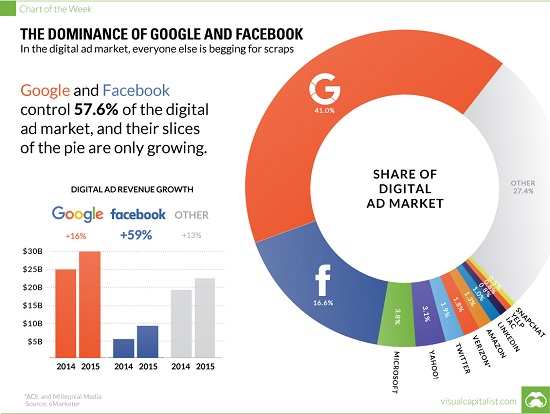Summary:
Let’s imagine a model in which the marketers of data distribute some of their immense profits to the users who created and thus “own” the data being sold for a premium. It’s not exactly news that Facebook, Google and other “free” services reap billions of dollars in profits by selling data mined/collected from their millions of users. As we know, If you’re not paying for it, you’re not the customer; you’re the product being sold, also phrased as if the service is free, you are the product. Correspondent GFB recently asked, why aren’t Facebook et al. sharing a slice of the profits reaped from users’ data with the users who create the data?Given the enormous data processing capabilities of these tech giants, it’s
Topics:
Charles Hugh Smith considers the following as important: Featured, newsletter, The United States
This could be interesting, too:
Let’s imagine a model in which the marketers of data distribute some of their immense profits to the users who created and thus “own” the data being sold for a premium. It’s not exactly news that Facebook, Google and other “free” services reap billions of dollars in profits by selling data mined/collected from their millions of users. As we know, If you’re not paying for it, you’re not the customer; you’re the product being sold, also phrased as if the service is free, you are the product. Correspondent GFB recently asked, why aren’t Facebook et al. sharing a slice of the profits reaped from users’ data with the users who create the data?Given the enormous data processing capabilities of these tech giants, it’s
Topics:
Charles Hugh Smith considers the following as important: Featured, newsletter, The United States
This could be interesting, too:
Nachrichten Ticker - www.finanzen.ch writes Die Performance der Kryptowährungen in KW 9: Das hat sich bei Bitcoin, Ether & Co. getan
Nachrichten Ticker - www.finanzen.ch writes Wer verbirgt sich hinter der Ethereum-Technologie?
Martin Hartmann writes Eine Analyse nach den Lehren von Milton Friedman
Marc Chandler writes March 2025 Monthly
Let’s imagine a model in which the marketers of data distribute some of their immense profits to the users who created and thus “own” the data being sold for a premium.
It’s not exactly news that Facebook, Google and other “free” services reap billions of dollars in profits by selling data mined/collected from their millions of users. As we know, If you’re not paying for it, you’re not the customer; you’re the product being sold, also phrased as if the service is free, you are the product.
Correspondent GFB recently asked, why aren’t Facebook et al. sharing a slice of the profits reaped from users’ data with the users who create the data?Given the enormous data processing capabilities of these tech giants, it’s certainly not a technical issue to credit each user a micro-payment when the data they create and thus “own” (since the creator of any digital product is by rights the owner of that product, including data sold to marketers) is sold.
Is the presumption that the collector of users’ data “own” that data via the collection process false, legally and ethically? Teams of attorneys may well be employed to support this claim on legal grounds, but what about the ethics of this data-mining of the many to profit the few with the means to collect and sell the data harvested from users?
Now that the ethical foundation of all these tech giants has been revealed to be nothing but shifting sand, it’s a line of inquiry worth pursuing. In some ways it parallels the situation in biomedicine: if a private-sector corporation harvests a particular genetic variation from an individual, do they “own” the variation because they detected it, or does the individual whose tissue/blood was harvested retain some ownership?
We need to differentiate sites and services that 1) do not collect data from users and 2) sell display advertising seen equally by all users (i.e. the traditional media model) and sites and services that 1) collect data from users as their “business model” / reason to exist and 2) sell marketing/advertising for a premium because it’s targeted to individual users.
The difference between these two models is obvious: one is “broadcast” available equally to users and advertisers alike. The other is “targeted marketing” based on data harvested from individual users.
I think the ethical case for sharing the profits reaped from selling the premiums gained by targeting users based on data harvested from them is strong. Note that the premium is derived not from some unique technology or intellectual property developed by Facebook, Google et al. but specifically and directly from the sale of data harvested from users.
|
Let’s imagine a model in which the marketers of data distribute some of their immense profits to the users who created and thus “own” the data being sold for a premium. This could be viewed as a royalty paid to the creators of the data or as a dividend paid to the pool of “owners” of the data being collected and sold.
However the payment is labeled, the point is that the profits should be shared with those who are creating the data being sold.
There are plenty of profits to be shared:
|
The Dominance of Google and Facebook, 2014 - 2015 |
Tags: Featured,newsletter


